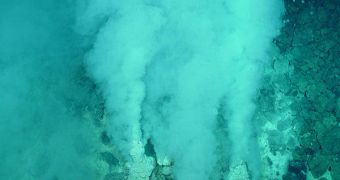The news came as a shock even to scientists gathered in Chicago at the annual meeting of the American Association for the Advancement of Science (AAAS). Arizona State University physicist professor Paul Davies said that “weird life” might be hiding right here on Earth, and that people needn't go as far as the Moon or Mars in order to discover and analyze it. According to the expert, these organisms have little to do with life as we know it, and differ from “regular” life forms in almost all respects.
Toxic arsenic lakes or boiling deep sea hydrothermal vents, he explained, could be among the most suited places where one should start looking for such creatures, as they held environments that were completely different from all others on the planet, including the deserts and the poles. So, Davies launched a call for a “mission to Earth,” urging fellow scientists to start trawling such places for signs of bio-activity.
“We don't have to go to other planets to find weird life. It could be right in front of our noses – or even in our noses. It is entirely reasonable to expect we will find a shadow biosphere here on Earth. But nobody has actually taken the trouble to look. The question is why? The cost is not expensive – it would be a fraction of the money we spend searching for extraterrestrial life,” he told other scientists.
“All our microscopes are customized for life as we know it – so it's no surprise that we haven't found microbes with different biochemistry. We don't quite know how weird life would look. It's as wide as the imagination and that's why it's really hard to look for. Maybe one of the elements life uses – carbon, hydrogen, oxygen, nitrogen, phosphorus – could be replaced by something else,” the professor maintained.
“The question would be whether this life was truly different, or whether there was a common precursor a deep branch on the main tree of life. Also, how do we know we are dealing with separate Earth genesis and not a Mars genesis? We know rocks do get traded between the two planets, and life could hitch a ride. Personally, I'm only interested in establishing whether life happened more than once. If we find it has happened twice from scratch, then it's going to have happened all around the universe. It's going to be teeming with life and there's a very good chance we are not alone,” Davies, who is also a theoretical physicist and the Director of the BEYOND Center for Fundamental Concepts in Science, concluded.

 14 DAY TRIAL //
14 DAY TRIAL //